Hickory Creek - Lewisville Lake
Close to the lake
Great sites close to the water.
The Lake Dallas area features multiple lakeside camping options within a short drive of the Dallas-Fort Worth metroplex. Willow Grove Park, located directly in Lake Dallas, offers both RV and tent camping with full hookups, showers, and direct lake access. Nearby Hickory Creek on Lewisville Lake provides a mix of developed sites with electric and water hookups alongside more primitive walk-in options. Other popular options include Pilot Knoll Park, Hidden Cove Park and Marina, and Lake Park Campground, all situated around Lewisville Lake. For those willing to drive slightly farther, Ray Roberts Lake State Park's Isle du Bois unit offers more spacious sites with greater privacy in a natural setting approximately 20 miles north.
Most campgrounds in the region require reservations, particularly during summer weekends when lakeside sites fill quickly. Weather considerations include hot, humid summers with temperatures regularly exceeding 90°F from June through September, and occasional severe thunderstorms with high winds. As one camper noted about Hickory Creek, "The location feels secluded from the city but close to the highway so you can be in the city within a few minutes drive." A common trade-off mentioned in reviews is ambient noise, particularly at campgrounds closer to highways or flight paths. Cell service is generally strong throughout the area, with most campgrounds reporting good coverage for major carriers.
Lakefront sites consistently receive the highest ratings from visitors, with many campers highlighting the cooling effect of lake breezes during hot weather. The Cross Timbers region provides shade trees at many campgrounds, though sites vary in tree coverage. Wildlife sightings, particularly deer and waterfowl, are frequently mentioned in reviews of the more natural areas. Facilities range from basic (vault toilets, no showers) at places like Sycamore Bend Park to full-service amenities at The Vineyards Campground. Several reviewers mention the family-friendly nature of the parks, with playgrounds and swimming areas available at many locations. Lake Dallas camping offers scenic waterfront campsites with convenient access to urban amenities, making it ideal for both weekend getaways and extended stays near the Dallas-Fort Worth area. Weekend crowding is common, with one visitor to Sycamore Bend noting, "We arrived on a Saturday around noon and took what seemed to be the last spot."
$14 - $30 / night
"Location: The location is tucked away in the small lakeside town of Hickory Creek...which is surrounded by Denton to the north and Lewisville/Dallas to the south."
"The location of this campground feels secluded from the city but close to the highway so you can be in the city within a few minutes drive."
"Stayed here as a group traveling to the Frisco, Texas area for a college football game. We spent 2 nights in a RV. Was within close distance to where we were attending the football game."
"Most Sites appear to be good size (at least those near our site). Has store onsite for drinks, snacks, etc. Ability to rent paddle boards and kayaks at the park to enjoy the lake."
$15 - $60 / night
"In the hot month of July 2020 I loaded up Little Red and headed out to spend several days camping at the Isle Du Bois Unit of Ray Roberts Lake."
"68 year-old solo camper getting ready to travel around the country, car/tent camping primarily."
$15 - $25 / night
"The walk-in to P07 was quite lengthy, but P11 had parking spots right next to camp."
"The lake was warm and there was a little "beach" for swimming- I would recommend water shoes and floaties! There are picnic tables and benches all over and tons of parking."
"Pros: Well maintained, great layout, great location, on the water. Cons: My only criticism is that our site positioned the sewer connection uphill from our trailer. A bit tough to use."
"Immediate access to the lake and a beautiful view! A great little escape from the city."
$20 - $35 / night
"It’s close to my home but makes me feel like I’m camping far away from home. Lots of trees, many spots right on the water, great kayak launch, has hiking trails and decent distance between sites."
"Nice RV sites, close to the water. Campground close to town but away from the noise. Nice boat ramp/dock and day use areas too. Recently renovated bathrooms. Staff friendly."
"This campground is nestled in the middle of a neighborhood on Lake Dallas. There are about 15 RV sites(30/50 amp), 15 primitive sites with showers and restrooms."
"Awesome park, great lake and a discgolf course within walking distance!!"
"My two boys 4/5 had a blast at the site, walking the trails, and finding spots to throw rocks into the lake."
"Lake front, kayak rentals with a great cove to paddle around in. Walking trails galore. Nice bathrooms, with showers."
"This just may become our home away from home. I absolutely love this little park. We stayed in spot#5 right at the end of the cove."
"Many spots are have direct access to the lake to launch a kayak or SUP, boat launch in the day use area."
$20 / night
"No access to drive to the actual site so I couldn’t use my RTT but it’s a short walk from where you park. Really nice park right on the lake, but it does get a bit crowded."
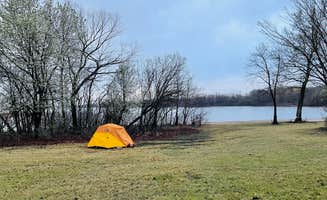
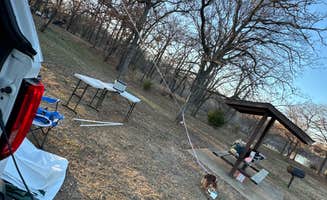
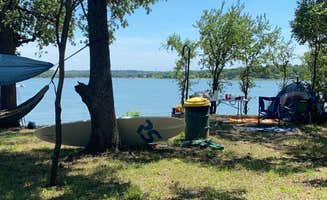
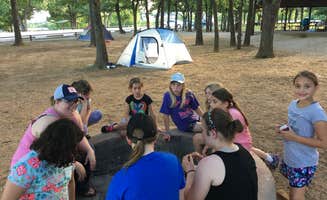
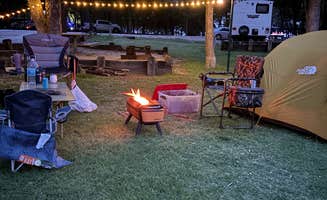
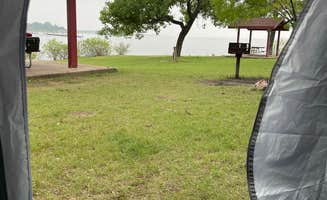
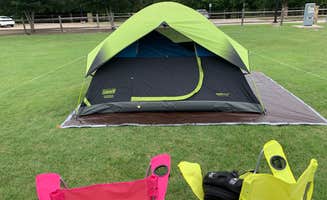
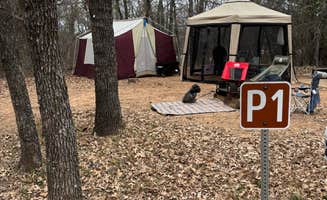
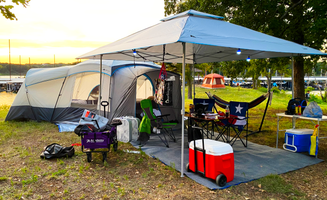
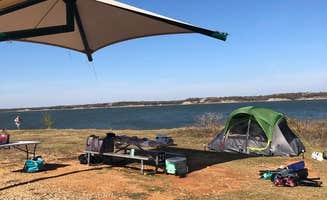
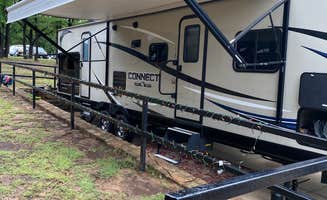

Great sites close to the water.
so close to everything stayed a month manger so helpful covered spots family friendly
From calling and asking on good spots with my setup to how clean the bathrooms and showers are (especially for the price), giving this place 5*s!
Beautiful setting along Lake Lewisville. Camped lakeside with a beach.
The Good, level, spacious campsites with an awning over the picnic table. Great lay out for campsites. The Lake Lavon was beautiful. The not so good, the restrooms were old and not well kept up. They were not heated which probably doesn't matter most of the time in Texas but when we were there it was 20 degrees. Secondly there is dog poop everywhere, it seems that every time I stepped off of the pavement I had to clean dog crap out of my shoes.
45-50 mins from downtown Dallas. Quiet in January. Stayed two nights, space 45. Level
This was the first time our family has camped two consecutive nights. My two boys 4/5 had a blast at the site, walking the trails, and finding spots to throw rocks into the lake. We were surprised at how quiet the campsites were, especially with how many people were staying in the park. P1 was great, right next to parking and the street, which was also the only minor drawback. If staying primitive, P3 is the way to go. We will definitely be back!
The RV sites have a full backyard in them with fire pit and easy access to hook up. The road in front feels kind of busy though, from the satellite view it looks pretty quaint but in reality it's kind of busy.
This reservation was made over the phone and was booked by Lake Point RV manager through the RoverPass system. Military discount was applied to our reservation. The park(please note I use“park” as my description in lieu of“resort” for this stay) is easy to find and navigate. Upon arrival I called the number left on the door and did not get an answer or message service. Another camper had a good direct number and Michelle was on sight within 10 minutes, but there is no regular staffed hours at the clubhouse/office. It is one large area with gravel roads and mostly level. Sites are easy to park and adequate space for larger RV configurations. Our site required minimal east to west leveling. Full hook ups all worked at our site, but some utilities can be long runs depending on type of RV(especially sewer). Bath/shower/laundry facilities are very nice and clean. There is a small center playground area and a good dog run. We had Verizon 5G hotspot signal which was adequate for our stay. I believe there is park wi-fi, but no information was provided at registration and we did not request since our hotspot was very good. Highway traffic noise is pretty significant here, especially if parked at the front of the park. The park itself was quiet and everyone was friendly; however, there are a lot of full time/extended RVs at this location and it appears this park is losing some of its RV traveler appeal. Amazon and package deliveries were made to the park. We did venture into Gainesville, TX and found some good coffee and bakery at Sweet Jayne’s. We would highly recommend Tia’s Tex-Mex BBQ in Valley View.
Lake Dallas camping areas offer diverse options ranging from primitive tent sites to luxury RV parks with full hookups. Located in the Cross Timbers ecoregion, the area sits at approximately 525 feet elevation and features a mix of oak-hickory forests and prairie landscapes. Summers can reach extreme heat indexes above 100°F while spring brings occasional severe storms with high wind potential.
Kayaking and paddleboarding access: Twin Coves Park offers convenient water recreation with rental equipment onsite. "Lake front, kayak rentals with a great cove to paddle around in. Walking trails galore," notes JoAnn about Twin Coves Park.
Mountain biking trails: Access wooded paths directly from your campsite at several parks. "You have a boat ramp, kajak launch, mountain bike trails," mentions frederic N. about the renovated Twin Coves campground facilities.
Fishing opportunities: Many campsites provide direct lake access for anglers. "My boys caught a 12 lb and 20 lb catfish right off the fishing dock," shares Natalie S. about The Vineyards Campground, highlighting the productive fishing available without needing a boat.
Basketball and playground access: Several parks feature recreation areas beyond water activities. "The park has a good pavilion with a basketball hoop and good playground equipment," notes Chris K. about Sycamore Bend Park, providing options when water activities aren't possible.
Direct water access: Waterfront sites consistently rank highest in camper satisfaction. "We stayed in spot#5 right at the end of the cove. Calm water, large lot land area and clean, easy access to walk right into the lake to swim," writes Monica C. about Pilot Knoll Park Campground.
Modern bathroom facilities: Upgraded shower and restroom buildings enhance comfort. "New, clean bathrooms. The cabins are well equipped with granite countertop kitchens even!" observes Susan T. about Twin Coves facilities.
Camp store conveniences: Some parks offer supplies without leaving the grounds. "The store is well stocked," notes Mel B. about Hidden Cove Park, appreciating not having to leave for basic necessities.
Privacy between sites: Spacing varies significantly between parks. "The primitive sites in the Hawthorne campgrounds are spaced a good distance apart and really give you a feel of isolation," shares Matt S. about Isle du Bois Campsites, noting the value of private camping areas.
Reservation requirements: Most lakeside campsites fill quickly, especially during peak season. "Reservations is done by calling the park, no online," explains Sybel P. about Lake Park Campground, noting this important detail for planning.
Access limitations: Some primitive sites require walking gear from parking areas. "The trail path to the campsites is further than indicated or implied on the website, which isn't a problem if you're packed light, but if you're car camping with heavy equipment you will be surprised how far it is," warns Christopher L. about Isle du Bois' primitive camping area.
Site differences: Research specific site numbers when booking. "The outer sites are more tree'd and private, while the inner spots have little to no trees or privacy," observes Jenny S. about Hidden Cove Park, highlighting the importance of site selection.
Security protocols: Some parks implement strict security measures. "Front gate gets locked at 11pm. If you don't make it, you have to park outside and walk in," cautions Scott K. about Lake Park Campground, important for those planning late arrivals.
Playground access: Several campgrounds feature play equipment for children. "There is also a small playground with slides and climbing structures across from the restrooms (lots 22-23). My youngest was super excited to see a little library set up at the playground," mentions Monica C. about Pilot Knoll Park.
Swimming areas: Designated swimming spots provide safer water recreation. "A 3-lane boat ramp to Lewisville Lake, rental paddle boarding, full marina, and swimming area," lists Richard M. about Hidden Cove's family-friendly amenities.
Educational opportunities: Wildlife viewing adds learning experiences. "A family of turkeys hangs out at the campgrounds," notes Mary Elisabeth D., highlighting natural encounters at Hidden Cove Park that can engage children.
Shade considerations: Tree cover varies significantly between campgrounds and specific sites. "The campsites near the water have absolutely no trees. I feel very exposed in those sites," warns Susan T. about Willow Grove Park, crucial information for summer camping with children.
Site parking regulations: Some parks enforce strict parking rules. "They are strict about parking; I got woken up around 1:30am by local police because I parked in an area I wasn't allowed to and also forgot to print a permit to put on my dash," shares Joyce L. about Willow Grove Park.
Water pressure variances: Equipment damage can occur without preparation. "I found the water pressure too strong for my class b as the pressure caused a link under my sink. Convinced me to purchase my own water pressure resistor gauge," advises Chris P. about Pilot Knoll Park.
Dump station locations: Not all parks offer convenient waste disposal. "The only 'negative' I found is that the sewage hook up is not at the actual site. There are dump stations in different places," notes Luis about Hickory Creek, important for planning longer stays.
Site leveling needs: Terrain varies across campgrounds. "Dirt sites with a small amount of pea gravel. Road into park is a narrow residential street. Entry gate is narrow," observes Me about Willow Grove, highlighting access and setup considerations for larger rigs.
Frequently Asked Questions
What are the best camping spots at Lake Dallas?
Lake Dallas offers several excellent camping options. Lake Park Campground is nestled in the middle of a neighborhood on Lake Dallas with about 15 RV sites (30/50 amp) and 15 primitive sites with showers and restrooms. The campground is well-maintained, regularly patrolled, and features a couple-mile paved walking trail. Another top option is Hickory Creek - Lewisville Lake, which offers a secluded feel despite being near the city. Campsites are spacious with great water views, and the location provides easy highway access while maintaining a peaceful atmosphere.
Are there any RV resorts near Lake Dallas worth visiting?
Treetops RV Resort is definitely worth visiting near Lake Dallas. This clean, quiet resort features beautiful shade trees throughout the property. Most spaces are pull-through and easy to set up, with each site including a fire pit and picnic table. The resort offers private bathhouses and reliable laundry services. For those seeking a state park experience with RV accommodations, Isle du Bois Campsites — Ray Roberts Lake State Park is one of the busiest Texas State Parks in North Texas, offering excellent facilities north of the DFW Metroplex.
What RV parks are available at Lake Dallas?
Rock Island RV Park offers a picturesque setting with RV sites surrounding a quaint pond where ducks and geese create a pleasant atmosphere. The park also features various animals on the premises, adding to its unique charm. Pilot Knoll Park Campground is another excellent option for RV camping near Lake Dallas, offering drive-in access with water hookups and facilities that accommodate big rigs. Both parks provide convenient access to Lake Dallas while maintaining a relaxing environment.
Keep Exploring